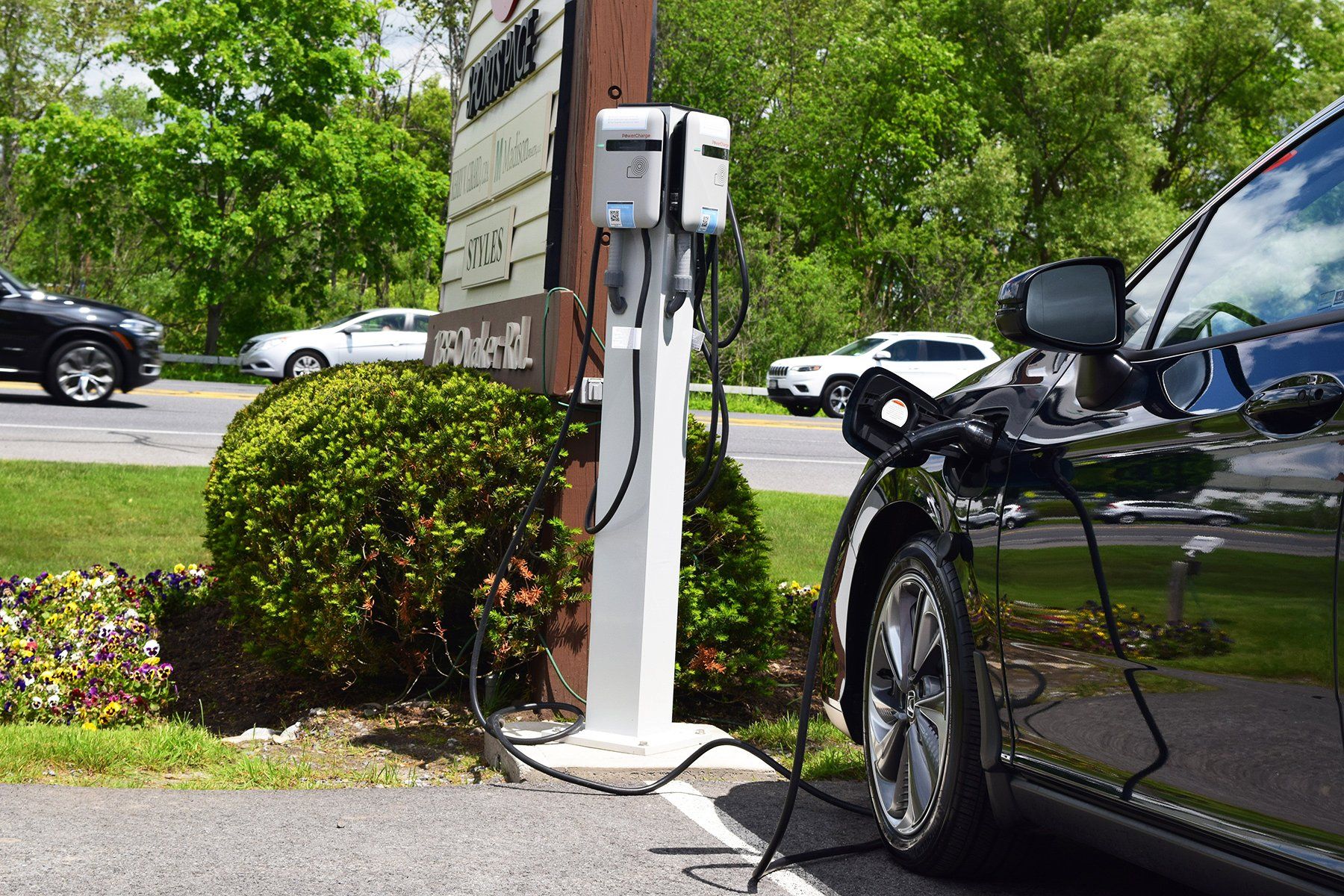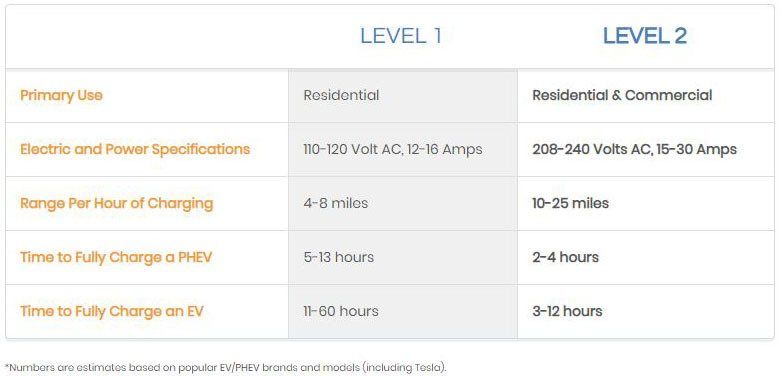Types of EV Chargers
When it comes to charging your electric vehicle at home or on the road there are different types of EV chargers that you should be aware of. Level 1 & 2 chargers are for at home use and Level 2, 3, & 4 chargers are for commercial use. You will need to know which ones are compatible with your vehicle, fit into your driving habits, and how quickly they can have you back on the road.
Level 1 & 2 Chargers
A Level 1 charger
is what comes with your electric vehicle at no extra cost. It feeds 120 volts and can be plugged into any standard household outlet. The drawback of a Level 1 charger is it takes a long time to fully charge the battery. This makes it difficult to rely on when you have a fully electric vehicle with a short driving range, low battery capacity, or low maximum acceptance rate. It also can be a challenge for people with a longer than average daily commute and those with no opportunity to charge their vehicle during the day. Level 1 chargers are great to have in case of an emergency but a Level 2 charger is more beneficial for anyone that uses their electric vehicle on a daily basis.
Level 2 chargers
feed 240 volts and charge up to 10 times faster compared to a Level 1 charger. With a Level 2 charger, stopping at home for a couple hours can extend your travel substantially. Installing a Level 2 charger at your home is beneficial as you can rely on your electric vehicle more and won’t worry if you will have enough battery life to get to work in the morning.
Level 2 Charging At Home
Having a Level 2 charger at home has a lot of advantageous. The major one is that it takes less time to charge your vehicle than a Level 1 charger. Other benefits to having one at home are:
- You can connect the charger to your home network and it will work with your smart devices
- Save more money by scheduling to charge during off-peak hours
- Remotely start/stop charging session
- Check progress of charge in real time
- Set reminder to get notified when charging is complete
- Monitor and track every charge, energy use, and cost
- Another great thing about Level 2 chargers is they can be mounted to your wall or installed on a pedestal, depending on your property. We can help you with both options and if any trenching is needed our crew can take care of it for you.
When having a Level 2 charger installed, you will want to have a licensed electrician install it for you. There is a lot of voltage to take into consideration and you want to make sure it is done right and safely. If any of your electrical components are too old or not strong enough to accommodate the EV you own or are looking to purchase, our licensed electrician can replace it for you at time of installation or upgrade it in the future.
Lastly, if you are looking for a Level 2 EV charging station, all of the ones that we offer come with a 3-year manufacturer’s warranty. On top of that, we also provide a 5-year workmanship warranty even if you are supplying an EV charger that you bought on your own.
Fast Chargers (Level 3 & 4)
Level 3 & 4 chargers are two other types of EV chargers that are used for commercial charging. They are commonly referred to as Fast Chargers since they are able to charge your electric vehicle at a much faster rate than Level 2 chargers. One thing to keep in mind when using these types of chargers is that they are meant to charge batteries that are very low. Fast Chargers are able to rapidly charge your battery and it will start to slow down the pace of the charge when it reaches 50%. It will tapper off even further when the battery hits 80% charged. The suggestion is that once your battery hits 80%, on one of these chargers, that you cease charging unless you absolutely need your vehicle fully charged. Some stations will actually cut off the charge at 80%.
Level 3 chargers can charge an empty battery in 20 minutes to an hour. Level 4 chargers are the Tesla Superchargers which are even faster than the Level 3 chargers. However, Level 4 chargers are only compatible with Teslas. Make sure you know which chargers are compatible with your electric vehicle before you hit the road.
There are many types of EV chargers out there and it’s good for you to know which ones are compatible with your vehicle and will fit your needs. There are also apps to help you locate EV charging stations
when on the go that would be beneficial for any EV driver to download.
Do you already drive an electric vehicle? Are you looking to add a charging station to your home or business? Do you want to power it with solar? We can help! You can reach out to us here
and we would be happy to help you with any of these projects.

As electric vehicles become more popular, the demand for EV chargers is growing fast. Every day, more EVs hit the road, and businesses are starting to take notice. Installing EV chargers at your location is a smart move—not just to keep up with the rise of electric cars, but also to show that you’re forward thinking and environmentally friendly. We've put together a list of the many benefits to installing EV chargers!

Utility costs are on the rise and there’s no sign of them slowing down. Consumers are feeling the pressure of constantly climbing electricity rates. As inflation continues to affect nearly every industry and energy demand increases, utility companies are charging more, which means your bills are getting higher. In fact, many experts agree that utility prices will only continue to increase, making it harder for households and businesses to keep their budgets under control. NYSERDA provides detailed information on historical energy rates throughout New York State for example. These patterns follow the same trends nationwide.


